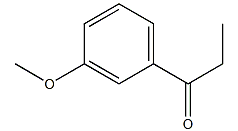Background and Overview[1]
Me-methoxypropiophenone is a key intermediate used in the production of the drug tapentadol. Tapentadol is a novel oral analgesic drug that acts on the central nervous system. It has two mechanisms of action: one is acting on the opioid μ2 receptor, inhibiting pain in the spinal cord by improving pain sensation and emotional factors. transmission, thereby affecting and controlling the activity of the cerebral cortex part that senses pain; the other is the inhibition of norepinephrine reuptake, inhibiting its reabsorption into nerve cells, thereby increasing the level of norepinephrine in the brain, similarly Also acts as an analgesic. Tapentadol does not rely on metabolic activation and has no metabolic activation products. It has a strong effect on various acute inflammations and neuralgias. Its efficacy is between morphine and tramadol. It can obtain higher results through intravenous injection and oral administration. Compared with morphine, it is less likely to produce analgesic tolerance and dependence than morphine. Pharmacokinetic studies show that the oral absolute bioavailability of tapentadol is 32%, and its metabolism is stable. It can be almost completely metabolized into inactive conjugates, and its metabolism reaches equilibrium after about 5 days.

Methoxypropiophenone
Preparation[2]
Preparation of m-methoxybenzoic acid:
Add water, solid NaOH, m-hydroxybenzoic acid and dimethyl sulfate into the container to carry out etherification reaction, then add acidic solution for acidification treatment, and obtain m-toluene after centrifugation and drying. Oxybenzoic acid. More specifically, add 80-120 parts by weight of m-hydroxybenzoic acid, 720-780 parts by weight of water and 130-170 parts by weight of solid NaOH in the container, then cool to 28-32°C and add dropwise 150-220 parts by weight of dimethyl acid, after the dripping is completed, heat it up to reflux, keep it warm for 5.5-6.5 hours, then cool it, pump it into another container, add hydrochloric acid, acidify it until the pH is 2-3, and then centrifuge and dry it. Dry.
Preparation of m-methoxybenzoyl chloride and m-methoxybenzamide:
Add the above-mentioned m-methoxybenzoic acid and toluene into the container, mix the two evenly, and then add thionyl chloride to perform an acid chlorination reaction to obtain m-methoxybenzoyl chloride. Mixed liquid; add ammonia water and ice cubes in another container, and then put the above mixed liquid containing m-methoxybenzoyl chloride into the ice to thaw. After centrifugation, water washing, draining and drying, the m-methoxybenzoyl chloride is obtained. Methoxybenzamide. More specifically, add 220-260 parts by weight of m-methoxybenzoic acid and 300-400 parts by weight of toluene into the container and stir evenly, then add 250-350 parts by weight of chlorine dropwise at 38-42°C. Dissolve into sulfoxide, then raise to 45-50°C and keep incubated for 9.5-10.5 hours; add ice cubes and 600-700 parts by weight of ammonia in another container, and then gradually add the insulated mixture to ice thaw, and the ice thaw is completed , stir for 20-40 minutes, then centrifuge, rinse with water, drain and dry.
Preparation of m-methoxybenzonitrile:
Add m-methoxybenzamide, acetonitrile and phosphorus oxychloride to a container to form a mixture containing m-methoxybenzamide; add ice water to another container, and then add The above-mentioned mixed solution containing m-methoxybenzamide is put into hydrolysis, and m-methoxybenzonitrile is obtained after layered washing and distillation. More specifically, add 150-170 parts by weight of m-methoxybenzamide and 250-350 parts by weight of acetonitrile in the container, raise the temperature to slight reflux, and slowly add 200-250 parts by weight of triacetonitrile dropwise. Phosphorus oxychloride, after dropping, keep it warm for 4-5 hours; add 500-700 parts by weight of ice water in another container, then gradually add the insulation solution, stir for 8-12 minutes after adding, and then stand still and separate into layers. Washing and distilling.
Preparation of m-methoxypropiophenone:
Add magnesium chips, tetrahydrofuran, toluene and ethyl bromide into the container, then add m-methoxybenzonitrile to obtain a mixed solution containing m-methoxybenzonitrile; in another container The above-mentioned mixed liquid containing m-methoxy benzonitrile is acidified, and the finished product of m-methoxy phenyl acetone is obtained through layering, extraction, water washing and distillation. More specifically, add 40-50 parts by weight of magnesium chips, 100-160 parts by weight of tetrahydrofuran and 300-400 parts by weight of toluene in the container, first drop a small amount of ethyl bromide in the container to initiate the reaction, Then slowly add the remaining part dropwise, and keep it warm for 1.5-2.5 hours. Then add 150-170 parts by weight of m-methoxybenzonitrile dropwise, and keep it warm for 5-7 hours. Add in another container. 600-800 parts by weight of water, add the above reaction solution into the container, and then carry out acidification, stilling, layering, extraction, washing and distillation to obtain the finished product of m-methoxypropiophenone.
Main reference materials
[1] Liu Ning, & Qu Yi. (2016). Synthesis of 2-nitro-5-methoxypropiophenone. Guangdong Chemical Industry, v.43;No.315(01), 65-66.
[2] Ma Hui, Feng Wenhua, & Liang Yuhua. (2010). Synthesis of tapentadol hydrochloride. Chinese Journal of Pharmaceutical Industry, 041(009), 641-644.
[3] Ren Jinzhi, Ye Xiaolei, & Jiang Tianwei. (2000). New synthesis route of ritodrine. Chinese Journal of Pharmaceutical Industry (06), 3-4.

 微信扫一扫打赏
微信扫一扫打赏

